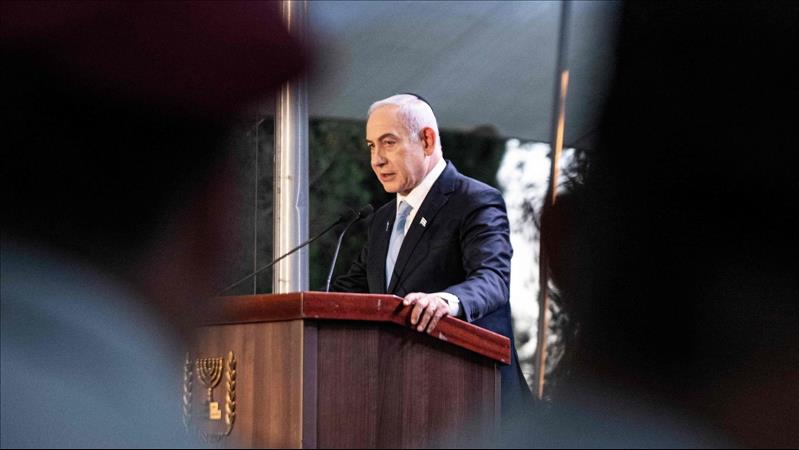
Netanyahu's Gamble: Can Israel's Prime Minister Get Away With Escalating Conflict In The Middle East?

Marwa El-Shinawy, Academic and writer
This makes us anticipate an increase in tensions in the Middle East, particularly given Iran's swift responses to the United States during the Trump administration following Soleimani's death, as well as its direct attacks on Israel. What makes this situation even more dangerous is the potential for other parties to become directly embroiled in the conflict. The killing of Ismail Haniyeh by Netanyahu on Iranian soil is a direct provocation to Iran, Hamas, and Hezbollah, especially in the wake of the assassination of prominent Hezbollah leader Fuad Shukr.
The assassination of Ismail Haniyeh marks Prime Minister Netanyahu's second endeavour to escalate the longstanding conflict between Israel and Iran into a confrontation, which had previously been conducted through proxies for many years. The initial instance occurred in early April when Israel targeted a structure near the Iranian consulate in Damascus, resulting in the deaths of seven members of the Iranian Revolutionary Guard, including the notable commander Mohammad Reza Zahedi. In retaliation, Iran executed a missile and drone assault on Israel. This incident represented Netanyahu's first provocation aimed at intensifying the conflict in the Middle East, an action that The Economist characterized as a significant escalation, highlighting that it was the inaugural occasion on which Iran attacked Israel directly from its territory. Additionally, an article from The Hill, a publication focused on congressional and White House matters, featured insights from Tara Sonnenshein, a researcher at the Fletcher School of Law and Diplomacy at Tufts University, who indicated that Iran may have crossed a“red line” by deploying drones against Israel.
Netanyahu's intentions to escalate the conflict in the Middle East are evident, as he stands to benefit significantly from such actions. By creating the illusion of victory following his failure to achieve tangible success in the Gaza conflict, he aims to bolster his political standing. Moreover, the prospect of a broader regional war serves as a convenient distraction from the atrocities and genocide being committed against innocent civilians in Gaza. Moreover, this potential escalation could potentially prolong Netanyahu's time in office and potentially shield him from impending legal consequences related to corruption charges.
However, Netanyahu's primary objective is to involve the United States in a large-scale conflict in the Middle East. He has consistently sought to instigate a direct clash between the United States and Iran, viewing it as a significant benefit for Israel. Netanyahu has been obsessively focused on this goal for an extended period. Research indicates that since the 1990s, Netanyahu has been warning about Iran's potential development of nuclear weapons, frequently urging the United States to authorize or carry out military strikes against Tehran. This campaign has been accompanied by covert Israeli operations aimed at disrupting Iran's nuclear program, including the targeted killings of key Iranian scientists and nuclear facilities. In his memoir,“Bibi: My Story,” Netanyahu recounts how he requested President Barack Obama in 2013 to launch strikes on Iranian nuclear sites during Obama's initial visit to Israel, a plea that was turned down. In 2015, Netanyahu spoke before a joint session of Congress, urging lawmakers to oppose the nuclear agreement with Iran known as the Joint Comprehensive Plan of Action, asserting that Iran not only poses a serious threat to Israel but also to global peace.
Today, Netanyahu finds it increasingly imperative to involve the United States in the Middle East for a variety of reasons. Firstly, to shield Israel from potential Iranian aggression, particularly in the aftermath of the exhaustive ten-month conflict in Gaza following the Hamas-led Operation Protective Edge on October 7, as well as attacks on Israeli settlements and other fronts, as reported by the New York Times. Secondly, to ensure that any future American agreement with Iran will not materialize in the event of a Democratic Party victory. Thirdly, the United States' backing of Netanyahu in this aggressive approach may serve to alleviate international criticism, particularly following the International Court of Justice's ruling that the occupation was illegal and the International Criminal Court prosecutor's announcement of seeking arrest warrants for Israeli Prime Minister Benjamin Netanyahu on charges of war crimes and crimes against humanity. Lastly, and most significantly, this escalation towards a regional conflict involving the United States will allow Netanyahu to alter the Middle East dynamics and present this contrived war as a necessary battle for Israel's survival in the hostile Middle East.
So far, it appears that the United States is aligning closely with Netanyahu's ambitions, particularly during the crucial period of the US elections, where Jewish funding and backing hold significant sway. Despite Biden's previous declaration that the US would not back any Israeli retaliation against Iran, emphasizing the divergence between Netanyahu's policies and those of the US, recent developments show an increase in American military presence in the Middle East. The US Department of Defense, through a statement from the Pentagon, announced the reinforcement of US forces in the region in anticipation of a potential Iranian strike on Israel, including the deployment of additional warships and fighter jets.
Certainly, the outbreak of a major war in the Middle East would harm American interests. For the United States, such a war would significantly expand its commitments and entanglements in the region at a time when the U.S. is seeking to withdraw its forces from the Middle East. More importantly, the U.S. blindly following Netanyahu's criminal escapades would undermine its prestige and influence in the Middle East, while bolstering the influence of other regional and international actors. However, Netanyahu continues to receive support, despite the hollow opposition statements issued by the Biden administration that are not implemented on the ground. The question is how far the United States will support Netanyahu's criminal actions.

Legal Disclaimer:
MENAFN provides the information “as is” without warranty of any kind. We do not accept any responsibility or liability for the accuracy, content, images, videos, licenses, completeness, legality, or reliability of the information contained in this article. If you have any complaints or copyright issues related to this article, kindly contact the provider above.
Most popular stories
Market Research

- Manuka Honey Market Report 2024, Industry Growth, Size, Share, Top Compan...
- Modular Kitchen Market 2024, Industry Growth, Share, Size, Key Players An...
- Acrylamide Production Cost Analysis Report: A Comprehensive Assessment Of...
- Fish Sauce Market 2024, Industry Trends, Growth, Demand And Analysis Repo...
- Australia Foreign Exchange Market Size, Growth, Industry Demand And Forec...
- Cold Pressed Oil Market Trends 2024, Leading Companies Share, Size And Fo...
- Pasta Sauce Market 2024, Industry Growth, Share, Size, Key Players Analys...
















Comments
No comment